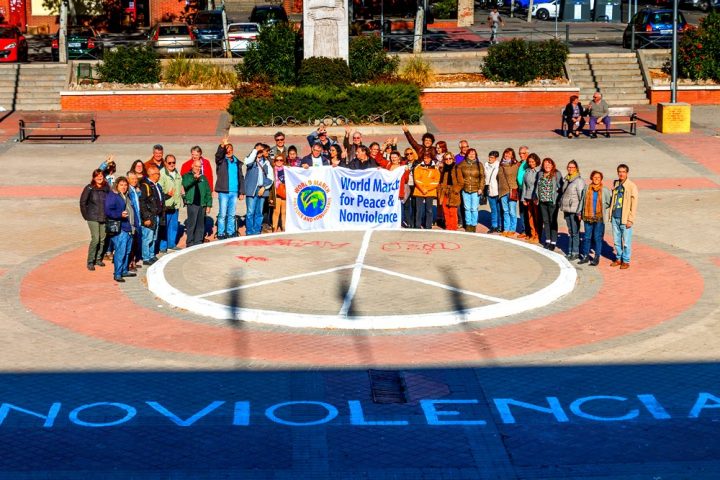This is the continuation of the first part of this article.
The panel on Participative democracy, technology and collective intelligence was moderated by the system engineer Carlos Rossique[i] who questioned the possible and desirable levels of democracy for the 21st century from the point of view of information theory and said, among other things that, “if we go deeper into this subject it’s because if violence is the imposition on some human beings by others, then peace and nonviolence will depend on how we evolve towards real democracy and collective intelligence.” Sergio Pascual[ii] (Spanish Deputy for Podemos) waded into the heated subject of sovereignty considering the different historical meanings of nationality as a “political subject”. Carlos Salgado[iii] (Demokratian) developed methodological questions about open lists and about online voting and spoke about his experience in developing the Demokratian electronic voting software. Ana Gonzalez Ledesma[iv], Doctor in computational linguistics introduced the concept of meta-organisation from techno-utopia. Luis Bodoque[v] (World without Wars, Canary Islands) centred his presentation on consensus as the only way towards collective intelligence.
The presentation on “Peace and Nonviolence from pacifist feminism” presented by Carmen Magallón[vi], president of the Women’s International league for Peace and Freedom-Spain[vii], said, “In order to build a culture of peace, it’s necessary to consider conflicts from other paradigms. Pacifist Feminism has been working for more than 100 years for disarmament, human rights and women’s participation in peace processes because even if not all women are pacifists, they are the majority in groups that oppose violence. WILPF Spain supports the 2nd World March for Peace and urges sensitisation of the population about the dangers of a nuclear confrontation. This is the only way that governments are going to sign the recent Treaty on the Prohibition of Nuclear Weapons.”
On the panel on “Culture at the service of Nonviolence” moderated by Martine Sicard, five people from different backgrounds and specialisations spoke. The professional clown, Pasquale Marino, actor and teacher from the Bergamotto Company[viii] talked about his experiences in Zaatari (Jordan), the second biggest refugee camp in the world with more than 100,000 people and in an indigenous Bolivian community. He underlined the value of being able make people laugh in situations of extreme violence. One of the creators and driving forces behind the Active Nonviolence Film Festival[ix], Pablo Martinez, presented this bi-annual polycentric festival that is self-managed, voluntary and free, with the next edition starting on the 2nd of October 2018. Moisés Mato[x] actor and director of the Listening Theatre[xi] which has been exploring social theatre for 24 years shared his current project that aims to instil nonviolence in young people. “What started in a rehearsal room will end up in attempts at real transformation”. Jana Traboulsi[xii], Lebanese professor and graphic designer, whose life has been marked by the brutality of war, expressed her doubts and hopes about the role of art in such a context. She asked herself, can art keep on embellishing war or should it become a tool for head-on resistance? Jean-Pierre Barou[xiii], co-editor of Indigène Editions[xiv], which published the famous essay by Stéphane Hessel, Time for Outrage, explained how his personal journey led him from radical militancy to become an editor committed to the cause of nonviolence, talking about its value as the author of the book, The Courage of Nonviolence.
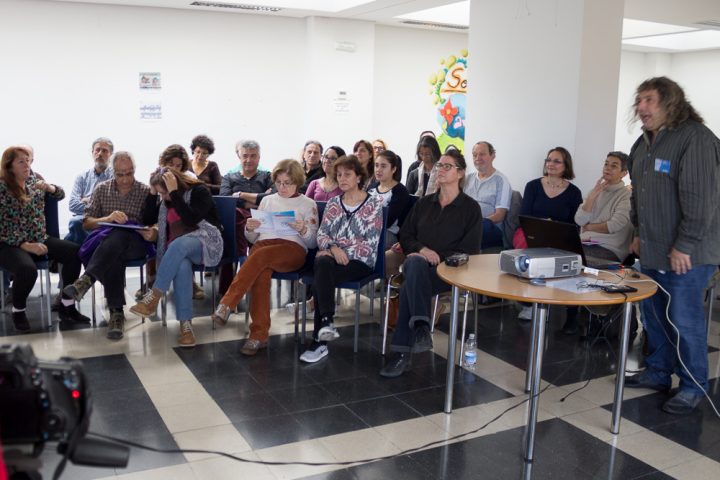
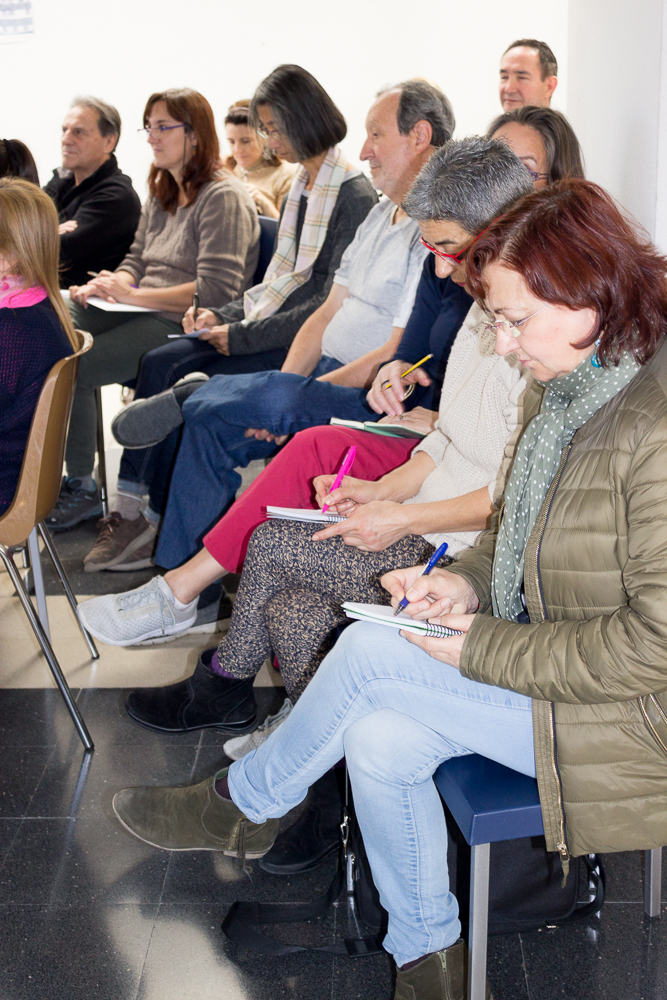
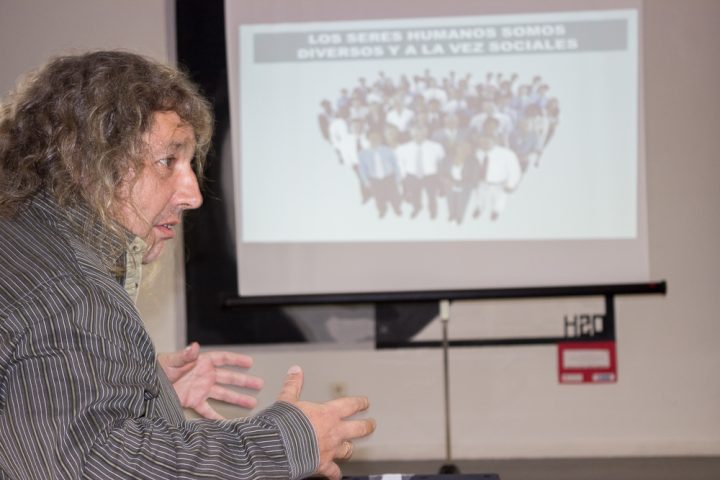
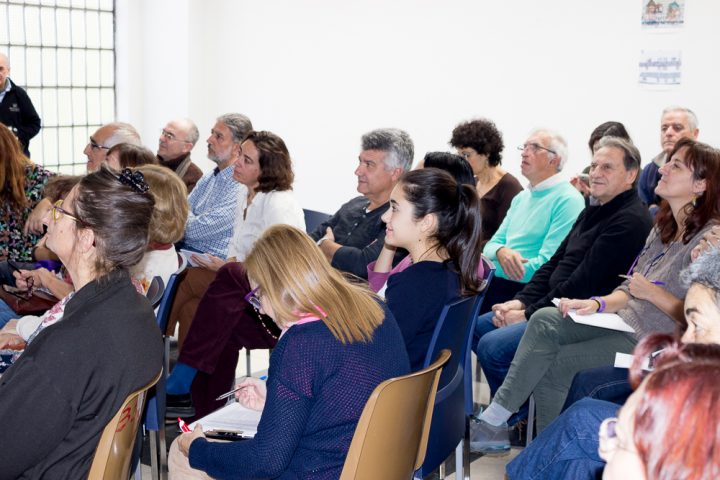
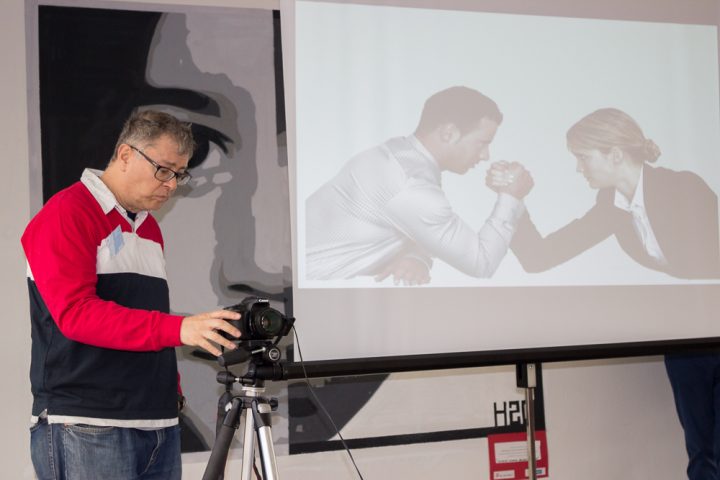
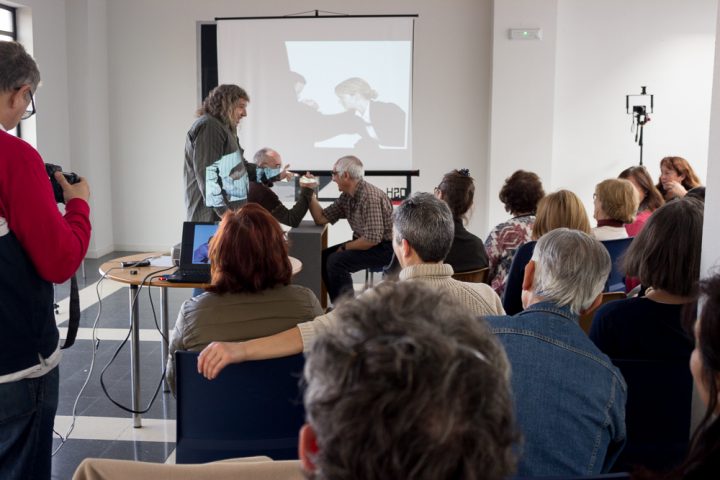
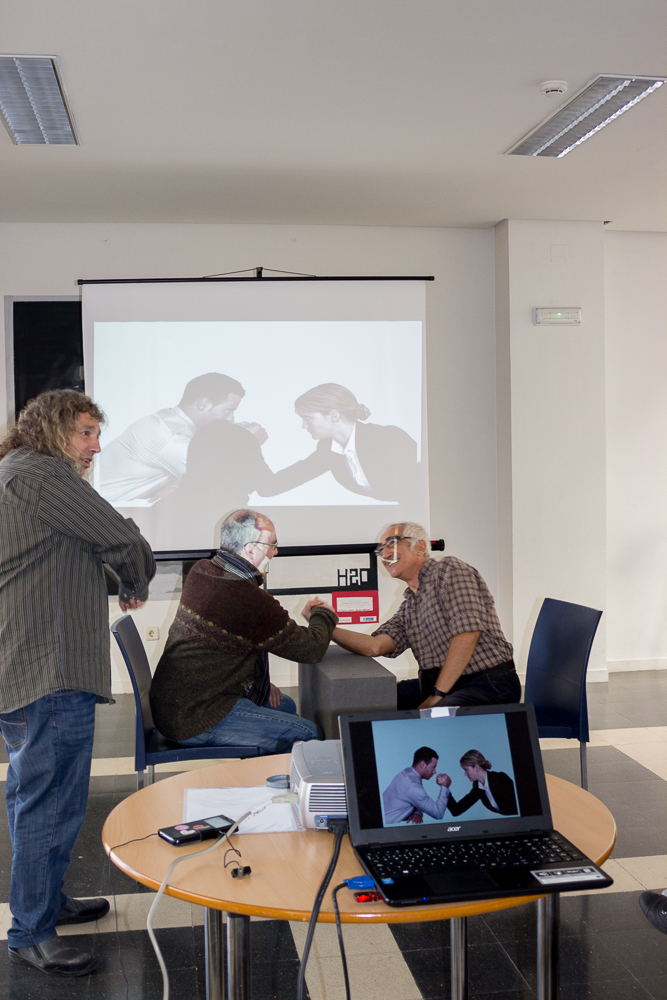
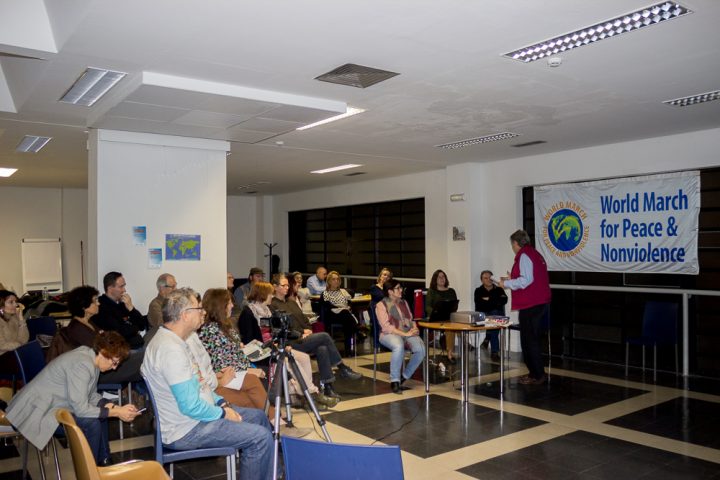
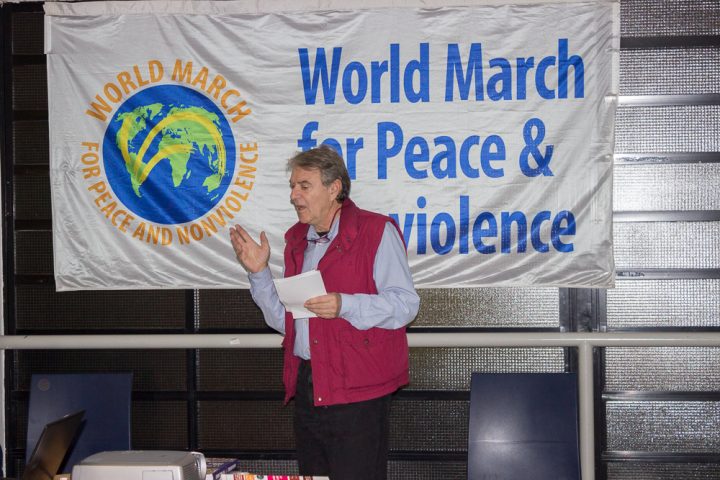
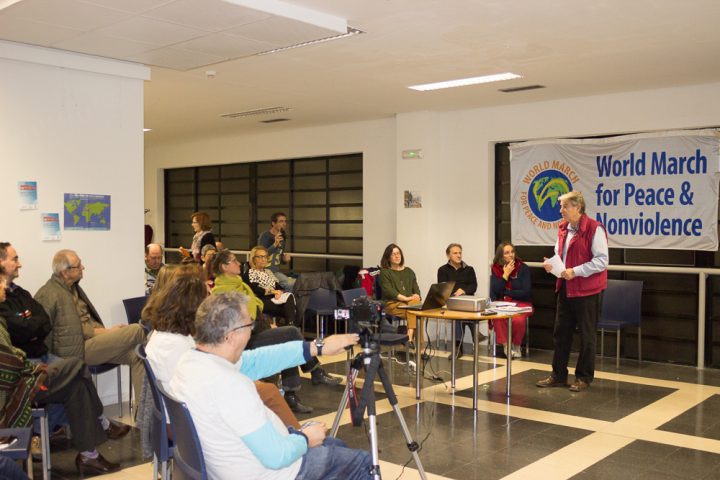
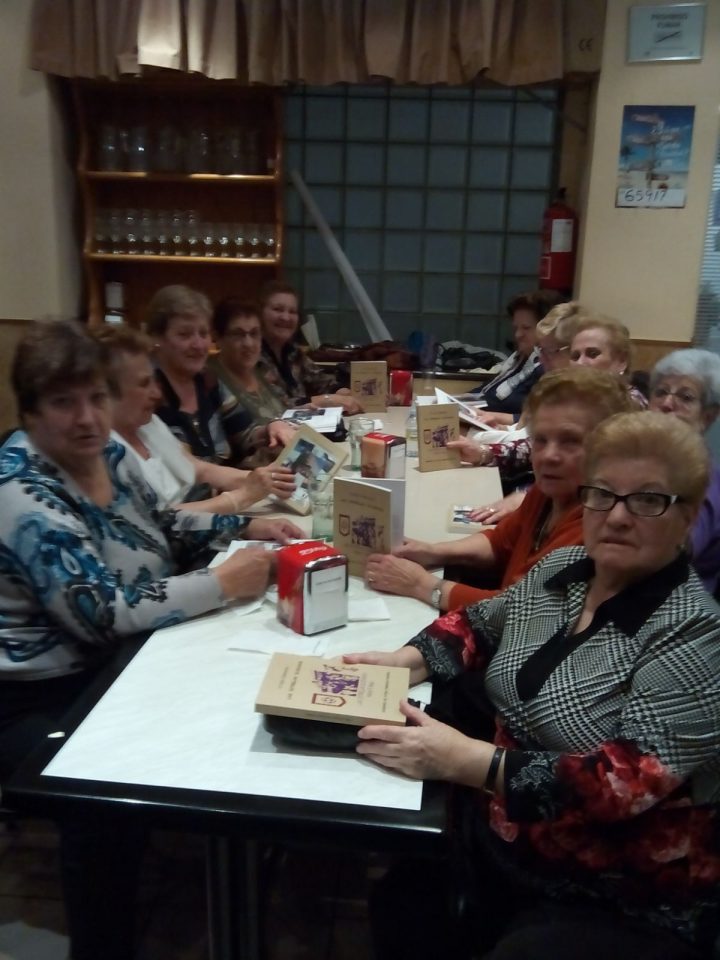
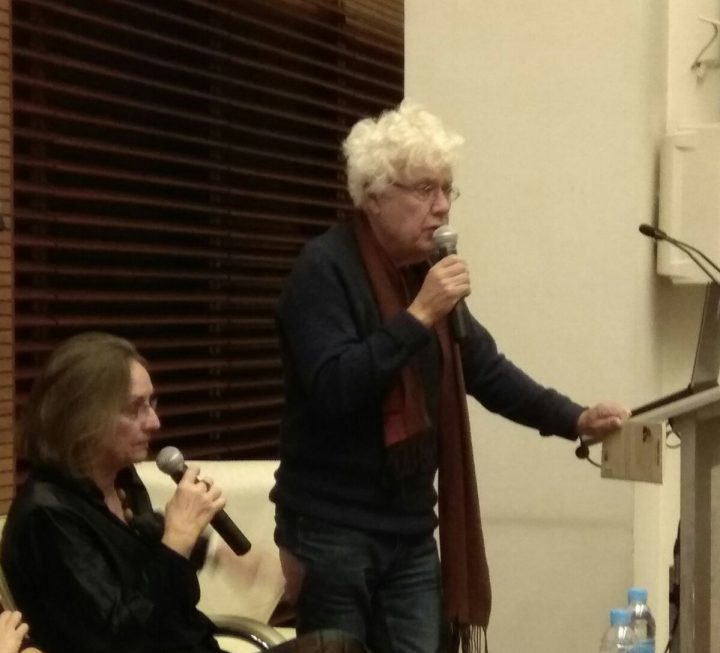
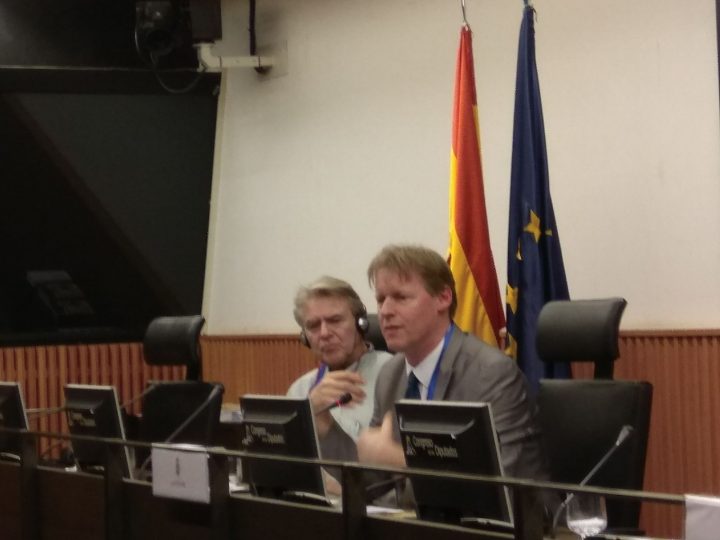
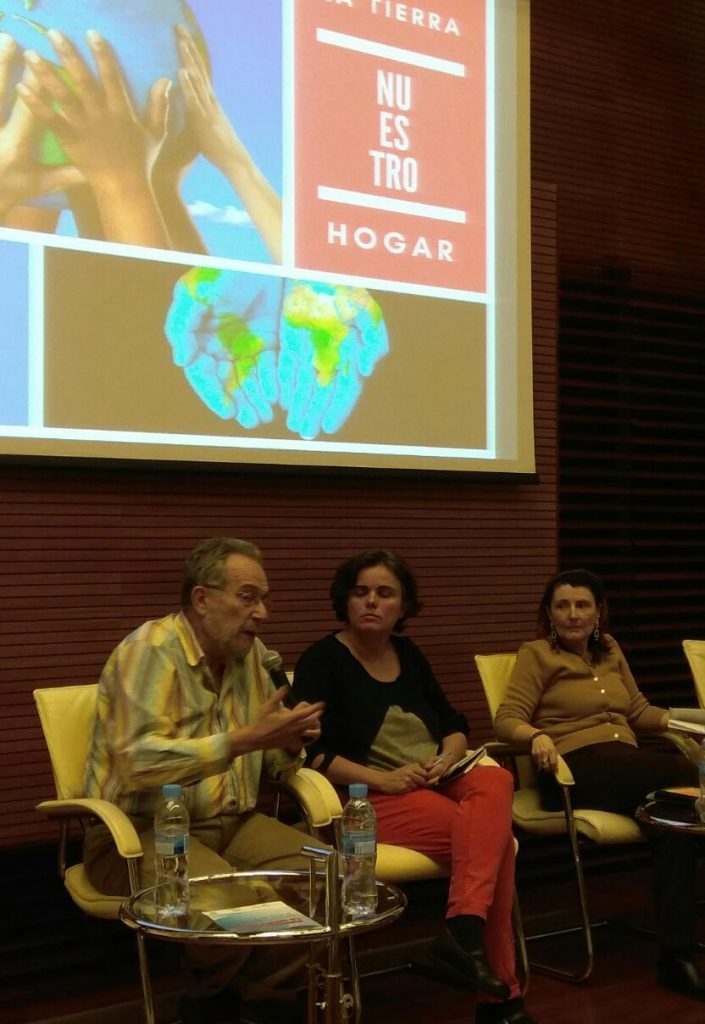
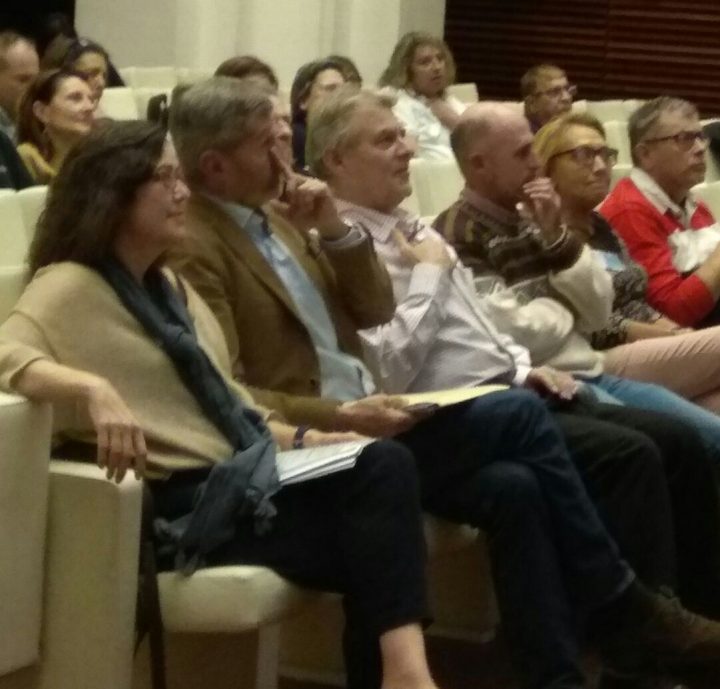
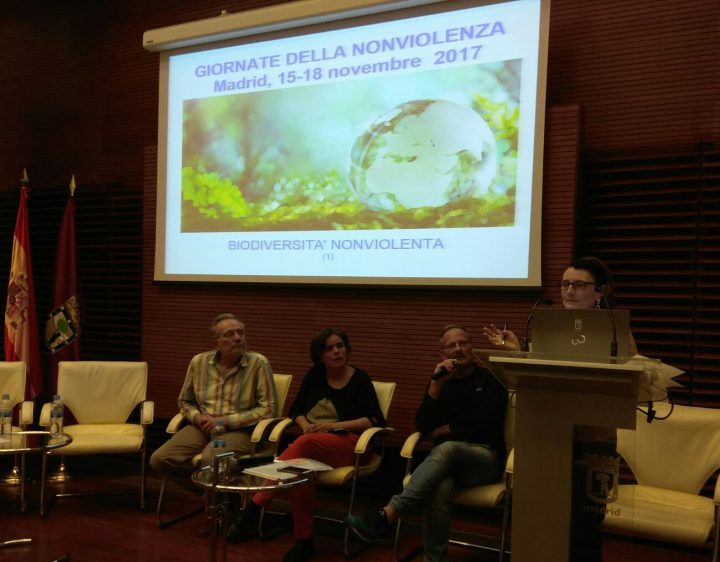
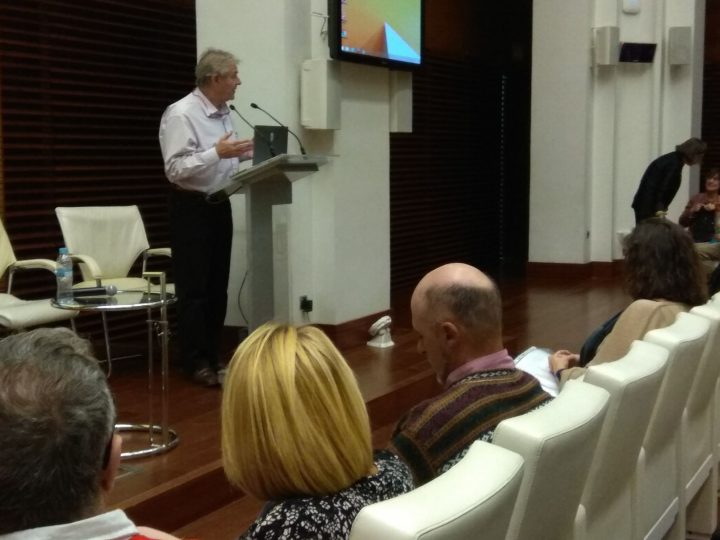
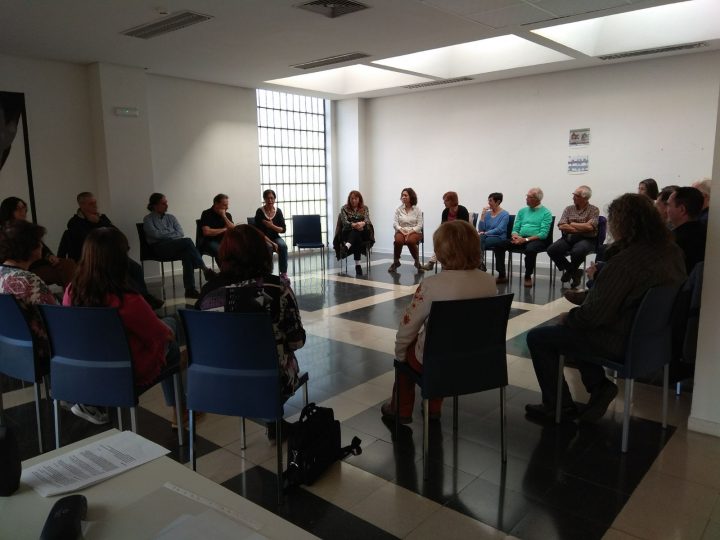
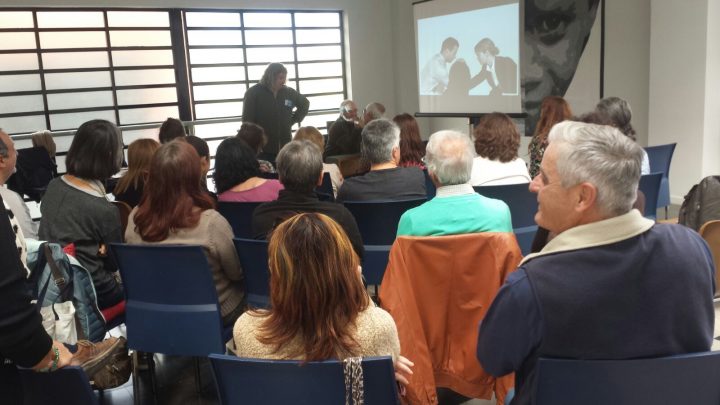
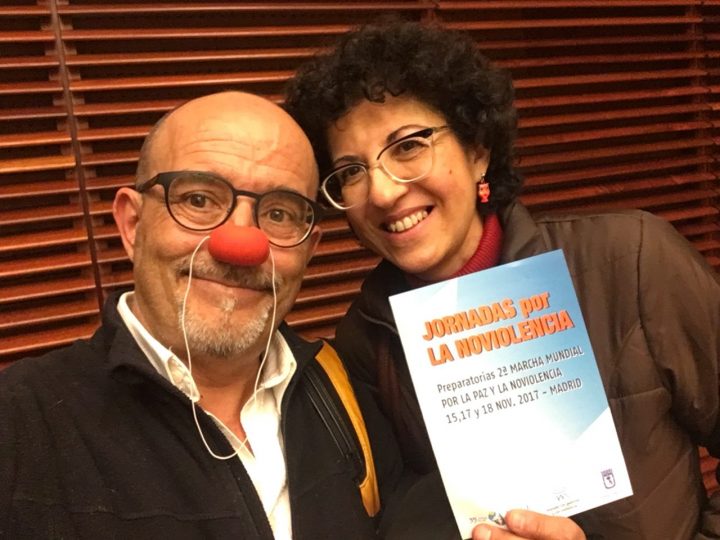
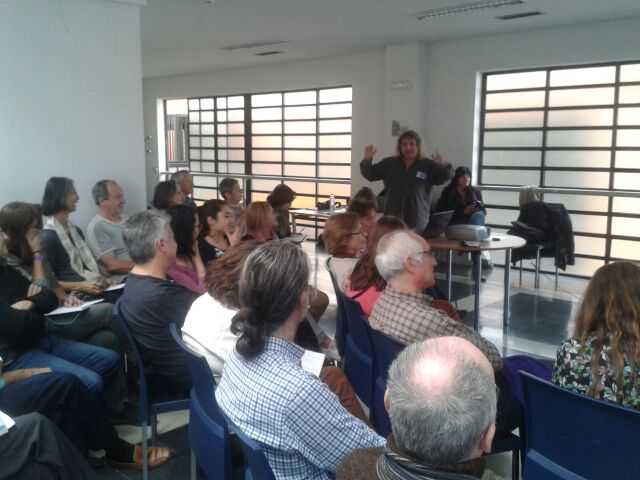
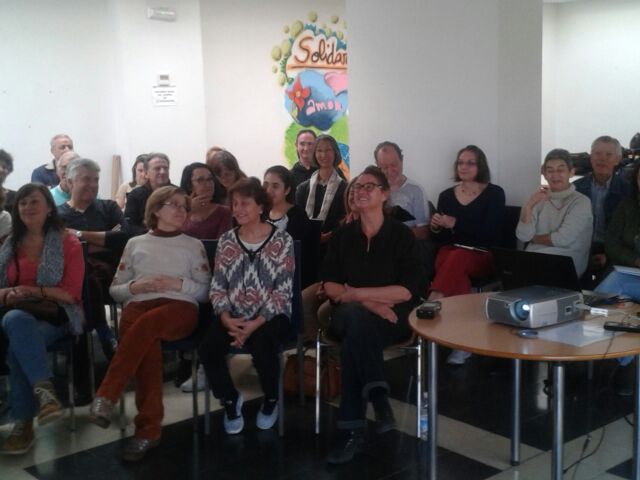
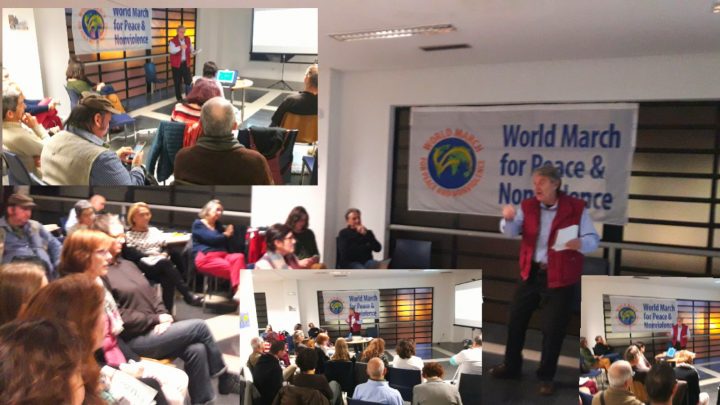
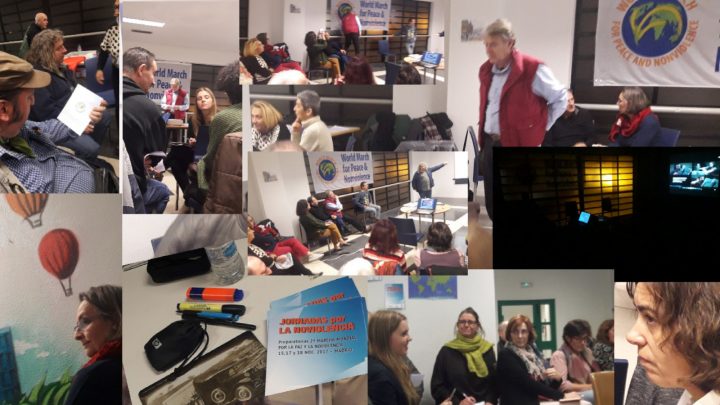
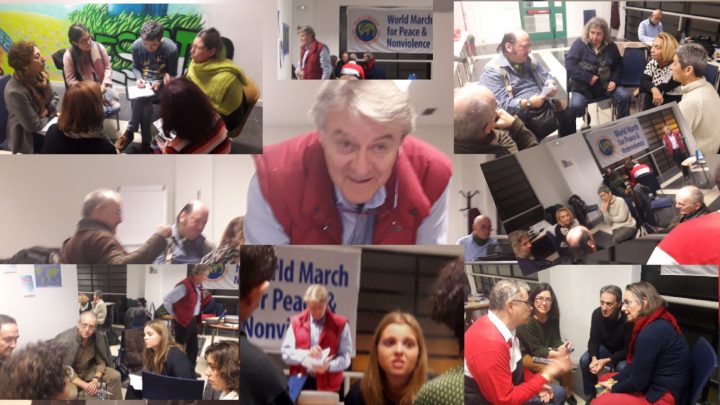
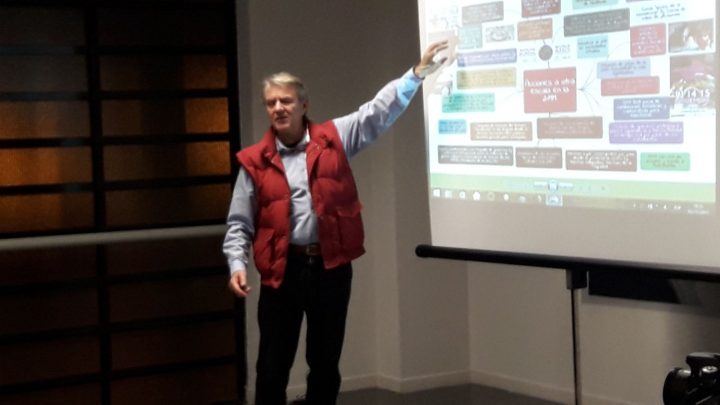
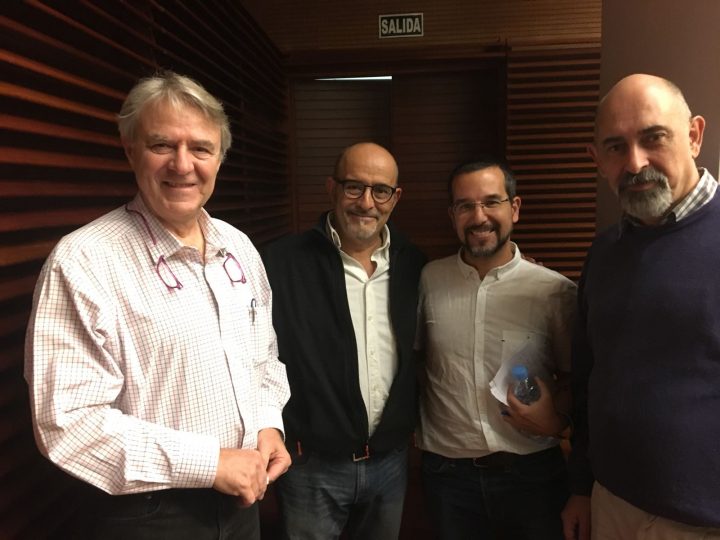
Other pictures in the Album by René Gómez
Montserrat Prieto talked about the campaign “nonviolence versus non-violence”[xv] that is being promoted by World without Wars and Violence. This action based on the Spanish language is being taken to other languages too, trying to give an identity to the term and the concept of “nonviolence” which doesn’t yet exist in Spanish and many other languages. It does exist however in English, Russian, Czech and Hindi, to name but a few examples. The axis on which the campaign is driven is to promote the word “nonviolence” without a hyphen, especially in the media and online, proposing to well-known authors to also use it. In this way, once its use has become widespread, acceptation can by requested in the different language academies, such as the Royal Spanish Academy which regulates the official Spanish language.
In the presentation on “The need to refound the United Nations”, Federico Mayor Zaragoza[xvi] former UNESCO director and president of the Peace Culture Foundation[xvii], said that “one of the great aims of this World March for Peace and Nonviolence must be the Refoundation of the United Nations. This is not an improvised proposition, but rather it is backed up by ample research. We want a General Assembly that responds to the lucid and foresighted first phrase of the United Nations Charter: ‘We the peoples determined to save succeeding generations from the scourge of war’ and that has 50% of State representatives and 50% representatives of civil society institutions. I also propose that an Environmental Security Council and a Social-Economic Security Council be added to the existing Security Council.”
In the presentation on “Disarmament and Security”, Julio Rodríguez[xviii] former Chief of Defence Staff of the Spanish Armed Forces, said, “what I’d like to do is transmit the message that is always associated with the military, to underline that this is a profession for which one trains and in which one has to be ready to use the highest expression of violence, but the final objective is to never have to use it. I have been accused many times of being anti-militaristic because I am against the supremacy of the military over civilians, something which is anti-constitutional. That’s why I define myself as anti-militaristic because I fight against that militarism in which there are civilians and military people that use militarism to fight politics. And this should be the final resort, the final resort is to be used when everything else has failed. When politics itself has failed…”
Podemos[xix] deputy, Pedro Arrojo[xx], Berta Iglesias from Ecologists in Action[xxi] and Tiziana Volta from World without Wars, Italy[xxii] took part in the panel “The Earth, our home. Resource depletion and global warming”. Arrojo said that, “in preparing for the 2nd World March my suggestion is that you consider putting the issue of environmental justice into the debate … Today a world in peace cannot be understood without the components of environmental sustainability and without the present and future viability of life on the planet…” Iglesias underlined the “urgency of the matter because even if we are starting to recognise that the problem of the environmental crisis exists, insufficient measures are being taken with respect to the needs of social ecologism…” Volta wanted to share her experience, “of what happened after the 1st World March in the province of Brescia which is very special because that is the home of the Ghedi NATO base with 20 nuclear weapons. The project that was created is called nonviolent biodiversity which sensitises people, and in particular the younger generation, using the “survivor” trees from Hiroshima and Nagasaki (The Ginkgo and Persimmon).”
In the “Presentation of the 2nd World March for Peace and Nonviolence”, Rafael de la Rubia from World without Wars and Violence[xxiii] described what had happened since the 1st World March[xxiv] to influence whether or not to do a 2nd March. He said, “We reached the conclusion that yes it is necessary, important and even urgent given the way that international events are going. What wasn’t at all clear is whether in a 2nd World March there would be the conditions to reach what we achieved in the 1st World March. That’s why, over the last two years, we have had some experiences that show that it is possible, and that furthermore it could be done with an even greater level of support than was achieved in the first one. This has tipped the balance in favour of doing a second world march with the following adjustments: A) It will be a March that starts and finishes in the same city. We will circumnavigate the world. B) We aim to repeat it every five years. In other words, now we are planning the marches for 2019 and 2024. C) In subsequent editions, cities will nominate themselves to host the start and end of the March and this host will be decided 2 years beforehand. D) The message will go beyond the issues of nuclear weapons and wars. This message, apart from touching on the central problems facing humanity, will always be a proposal. The March will also be a path on which one may find social and personal renewal. Everyone who participates will take the aspects that resonate with them the most.”
Workshops
On Saturday, 18th of November, four workshops were held in the Pozo Cultural Centre in Vallecas.
“The sensibility in the culture of nonviolence”, was presented by Consuelo Fernandez and Angelica Soler. Aimed principally for education professionals, it had an eminently lucid dynamic in which work was done on one’s own affectivity and in exploring different facets of emotion. In the interchange it became evident how interesting and, for some, very novel the use of “games” as a tool for developing the emotion is.
Luis Bodoque, social mediator, coordinated the two following workshops, “Introduction to Consensus. Facilitation of Assemblies” and “The empathic method for conflict resolution”, in which the concept of consensus and how to manage relationships so that they don’t lead to conflict was deepened, all in clear language and with a very dynamic and entertaining scene-setting. The need to continue developing a culture based on dialogue, mutual listening and complementation of ideas was seen.
The day and conference was closed with the workshop, “How to create conditions for the 2nd World March for Peace and Nonviolence” coordinated by Rafael de la Rubia and targeted towards anyone interested in involving themselves in concrete actions and/or functions in the 2nd World March that will circle the world between the 2nd of October 2019 and the 8th of March 2020. It was a theoretical/practical workshop that aimed to drive forward the carrying out of exemplary actions. In it already completed actions were reviewed that had the characteristic of producing demonstration effects, actions that can be replicated on different scales, actions on another scale and viral actions. The different possible kinds of marches were also reviewed, the trunk route, convergent and regional marches, and the importance of organising conferences, forums, large-scale citizen consultations, human symbols of peace and nonviolence, training in social activism and the creation of networks. Emphasis was placed on the participation of universities, city councils and parliamentary networks. The interest is to create the best conditions for the launch of the 2nd World March in 2018.
Working groups were organised on what actions could be imagined and done by each one of the participants in the 2nd World March projecting to a different scale what is already being done in the social field.
Before the questions about the timetable for the 2nd World March, the calendar presented was:
In 2018, Promotion Teams (PT) for the 2nd World March will be organised by city on the basis of precise initiatives. Where there are several cities, they will organise at the country-level. These PTs will arise through actions and projects that will arise from the social base. Everyone will take charge of what they propose. We aspire that, as in the 1st World March, thousands of organisations and collectives collaborate, making the WM their own. In July of 2018, with the information received, all the initiatives will be assembled together. In October of the same year, in Madrid, the world launch of the 2nd WM will take place, with the trunk route, converging routes, the calendar and its main elements already defined.
From the launch of the 2nd WM in 2018 and until the time in 2019 when it sets off, there will be launches by country around 6 months before the 2nd World March is scheduled to reach there. At the beginning of 2019 the members of the Base Team will be defined and it will have the task of travelling on the trunk route. We aspire that Base Team members will carry out activities on the journey and also develop functions within the team.
The 2nd World March will start in Madrid on the 2nd of October 2019, the International Day of Nonviolence, and 10 years to the day since the 1st World March. It will head to Africa, then America, Oceania, Asia and Europe arriving back in Madrid 159 days later on the 8th of March 2020, International Women’s Day.
De la Rubia closed the workshop thanking “all those who are already collaborating and making it so that this action gains more and more strength, meaning and inspiration…”
[i] Blog http://crossique.net/
[ii] https://es.wikipedia.org/wiki/Sergio_Pascual
[iii] Blog http://carlos-salgado.es/
[iv] Blog http://www.analedesma.es/
[v] Video channel http://www.downyoutubemp4.net/channel/UCsog32lIysM-iprtmEpSa4w
[vi] Carmen Magallon https://wilpf.es/team/carmen-magallon/
[vii] WILPF-Spain https://wilpf.es/
[viii] Bergamotto Company http://bergamottocompany.com/espa%C3%B1ol/clown%20bergamotto%20show.html
[ix] FICNOVA http://www.festivalcinenoviolencia.org/
[x] Moisés Mato http://salametaforas.com/tag/moises-mato/
[xi] Listening Theatre http://salametaforas.com/centro-de-formacion-del-teatro-de-la-escucha/
[xii] Jana Tramboulsi http://leportajauni.free.fr/pages/auteurs/janatraboulsi.html
[xiii] Jean-Pierre Barou http://www.indigene-editions.fr/fondateurs/jean-pierre-barou-biographie.html
[xiv] http://www.indigene-editions.fr/
[xv] The need for the word “nonviolence”
[xvi] Message of support for the 2nd World March for Peace and Nonviolence
[xvii] Peace Culture Foundation http://www.fund-culturadepaz.org/
[xviii] Julio Rodriguez https://es.wikipedia.org/wiki/Jos%C3%A9_Julio_Rodr%C3%ADguez
[xix] Podemos https://podemos.info/
[xx] Pedro Arrojo https://es.wikipedia.org/wiki/Pedro_Arrojo
[xxi] Ecologistas en Acción https://www.ecologistasenaccion.org/
[xxii] World without Wars and Violence, Italy https://www.mondosenzaguerre.org/chi-siamo.html
[xxiii] World without Wars and Violence, international http://www.mundosinguerras.org/es
[xxiv] 1st World March http://www.theworldmarch.org/


